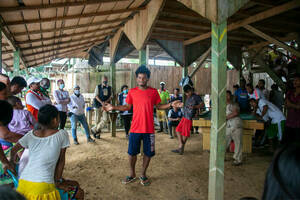
In this issue of Peace Policy, we reflect on the importance of centering young people in peace processes, and ensuring that conflicts of any form and stage can be successfully transformed into social worlds with the capacity to continually nurture and reproduce peace. Centering young people is not something we can just talk about or highlight from the ivory tower, as doing so privileges the voices of scholars whose voices have already been established. We must practice what we preach, which means taking young people seriously not just in theory, but actively creating and ceding spaces in which the voices of not-yet-established peacebuilders can be heard.
We utilize this issue of Peace Policy as a platform for hearing young peacebuilders reflect, in their own words, on conflict, generation, and the importance of youth to sustainable peace.
Catherine Bolten, Associate Professor of Anthropology and Peace Studies; Guest Editor for this Peace Policy issue
Prashan de Visser, founder of Global Unites, an organization that aims to inspire, connect and equip youth to transform global societies through movements promoting nonviolence and reconciliation, offers two key reasons why its critical to involve youth in peacebuilding efforts: demographics and youth as mentally, socially, and emotionaly flexible. More »
Butler University Professor Siobhán McEvoy-Levy and two students who are (or were) part of the Desmond Tutu Peace Lab explore the many ways youth and young adults are key to building sustainable peace. More »
Naún Álvarez González, coordinator of the Youth Peace Provokers of the Alta Montaña social movement and the President of the Community Action Council of Camarón, Colombia, explores lessons from youth involved in peacebuilding in Colombia. More »
About Peace Policy
Peace Policy offers research-based insights, commentary, and solutions to the global challenge of violent conflict. Each issue features the writing of scholars and practitioners who investigate the causes of violent conflict and who seek to contribute to effective solutions and alternatives to the use of force.
Visit the latest issue of Peace Policy at peacepolicy.nd.edu